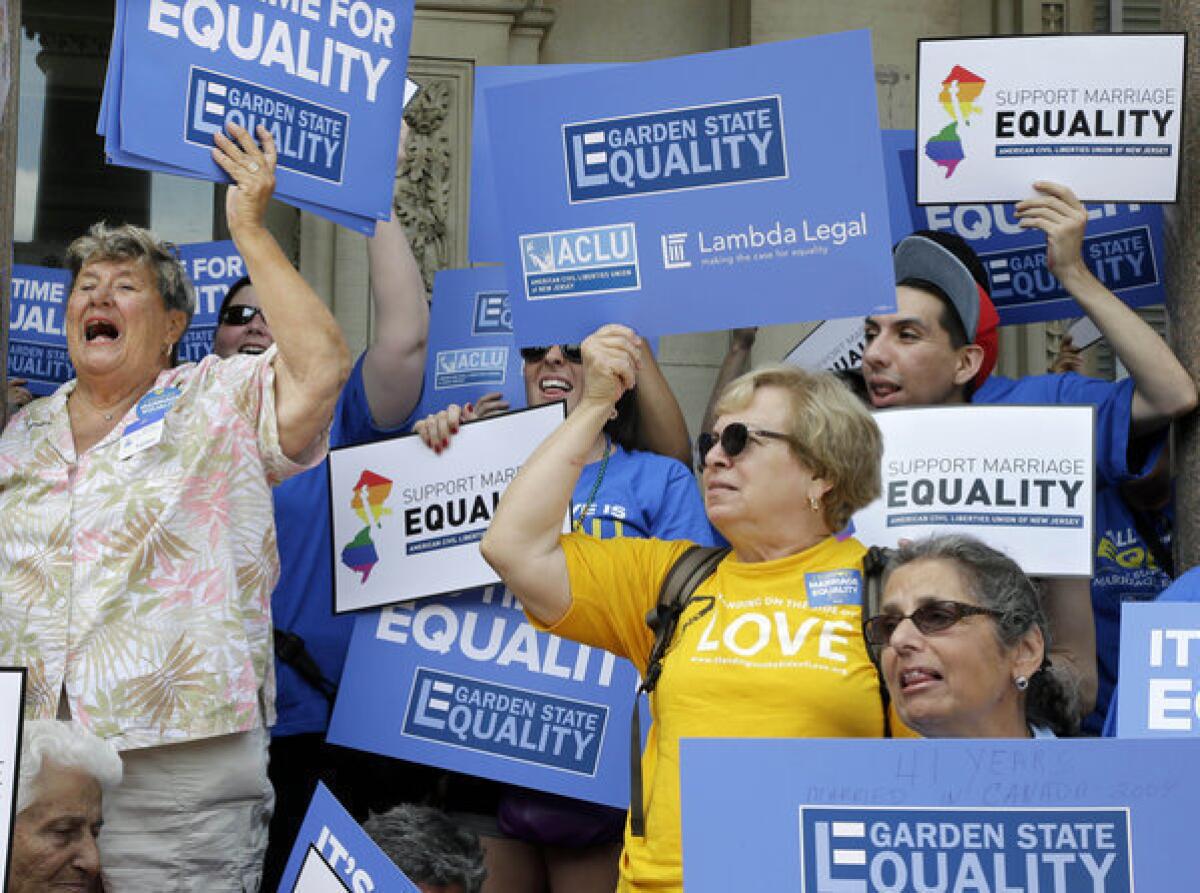New Jersey court hears arguments to allow gay marriage

- Share via
Only two states in the Northeast do not currently allow same-sex marriage, and lawyers on Thursday were trying to change the situation in one of them.
New Jersey allows civil unions but not same-sex marriage, after a 2006 court decision mandated that such couples be afforded the same rights and benefits that married heterosexual couples receive. The Supreme Court, however, invalidated the Defense of Marriage Act in June and also let stand a ruling overturning California’s Proposition 8, which cleared the way for same-sex marriages to resume in the state.
New Jersey Gov. Chris Christie, a Roman Catholic who is considered a top contender for the Republican nomination for president in 2016, disagrees and has called the rulings an example of “judicial supremacy.”
A judge will hear arguments on the issue Thursday in New Jersey Superior Court, the first time that a lower court is being asked to interpret the Supreme Court’s rulings and their effect on state law. (Pennsylvania is the other state that does not allow same-sex marriages.)
Lambda Legal, which is representing plaintiffs including Garden State Equality and six couples and their children in their lawsuit against New Jersey’s attorney general and other state officials, has filed a motion for summary judgment, basically asking a judge to immediately permit same-sex marriage.
Because the Supreme Court’s decision striking down DOMA allows federal benefits to married same-sex couples, New Jersey’s law, in essence, prevents gay couples in civil unions from receiving benefits, the plaintiffs argue.
“Although the state insists that, under New Jersey law, civil-unioned couples have the legal equivalent of marriage and are appropriately designated as spouses, it cannot escape the basic reality that civil-unioned couples are not in fact married under New Jersey law and are, accordingly, being denied federal marital benefits,” plaintiffs argued in the motion for summary judgment.
In contrast, the state of New Jersey argues, in court documents, that the judge should let the 2006 court ruling stand.
“The New Jersey Supreme Court has already conducted an equal protection balancing test and determined that a parallel statute that provides same-sex couples with all of the same rights and benefits that married couples enjoy under the State’s laws is constitutionally permissible,” said a brief submitted by John J. Hoffman, New Jersey’s acting attorney general.
Civil unions, once the only way for same-sex couples to receive benefits when they were not married, are now fading out in the few states that still offer them. The Rhode Island Legislature in May voted to allow same-sex marriages, replacing the civil unions that had been offered since 2011. In Delaware, where civil unions have been allowed since 2011, the Legislature recently adopted a law that will convert civil unions into marriages. A court case in Illinois is challenging the state’s ban on gay marriage -- currently same sex couples in Illinois are allowed only civil unions.
The Supreme Court’s ruling makes it likely that many states may no longer find civil unions viable, said Carlos Ball, a professor at the Rutgers School of Law-Newark and an expert on LGBT legal cases, because the ruling made the difference between civil unions and marriage quite stark.
“The Supreme Court’s ruling striking down DOMA significantly strengthens the plaintiffs’ claims that New Jersey civil unions do not provide the same benefits as marriage,” he wrote, in an email. “As a result of the Supreme Court’s ruling, married same-sex couples in neighboring New York, for example, are eligible for hundreds of federal rights and benefits that same-sex couples in New Jersey are denied.”
The New Jersey Legislature passed a bill allowing same sex marriage last year, but it was vetoed by Christie. A Quinnipiac University poll last month showed that 60% of New Jersey voters support a state law allowing same-sex marriage. At the same time, Christie’s approval rating was 68%.
Because the case is about state rather than federal law, it may not have the same national implications as cases over statutes such as Proposition 8, which went all the way to the Supreme Court.
Michael Dorf, a law professor at Cornell, said that doesn’t mean it won’t have implications in other ways, should the plaintiffs prevail.
“I don’t think it has any direct national implications, but of course this is part of an ongoing social and political movement,” he said. “If the court recognizes the right to same sex marriage, no matter how, that counts as a victory of marriage equality.”
ALSO:
Timeline: gay marriage chronology
Military to allow leave for gay weddings
Long lines for same-sex marriage in California
Twitter: @AlanaSemuels
Follow L.A. Times National on Twitter
More to Read
Sign up for Essential California
The most important California stories and recommendations in your inbox every morning.
You may occasionally receive promotional content from the Los Angeles Times.











